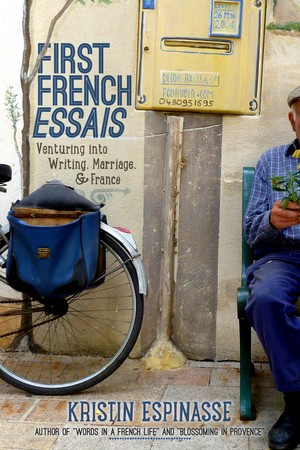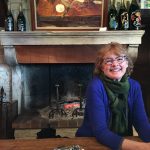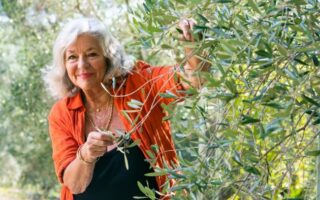An Interview with Kristin Espinasse, Creator of “French Word a Day”
- SUBSCRIBE
- ALREADY SUBSCRIBED?
BECOME A BONJOUR PARIS MEMBER
Gain full access to our collection of over 5,000 articles and bring the City of Light into your life. Just 60 USD per year.
Find out why you should become a member here.
Sign in
Fill in your credentials below.
 Kristin Espinasse grew up in the U.S., met and fell in love with her French husband in Aix-en-Provence, and since 1992 has made her life as a wife, mother, and writer in the South of France. She is the author of three books: the most recently published is First French Essais: Venturing into Writing, Marriage & France. In 2002 she created French Word a Day, a blog that celebrates French life and the French language, and that now has more than 40,000 subscribers, mostly in the U.S. and Canada but also in France, the U.K., Australia and beyond. She recently took the time to answer questions posed by BP writer Janet Hulstrand.
Kristin Espinasse grew up in the U.S., met and fell in love with her French husband in Aix-en-Provence, and since 1992 has made her life as a wife, mother, and writer in the South of France. She is the author of three books: the most recently published is First French Essais: Venturing into Writing, Marriage & France. In 2002 she created French Word a Day, a blog that celebrates French life and the French language, and that now has more than 40,000 subscribers, mostly in the U.S. and Canada but also in France, the U.K., Australia and beyond. She recently took the time to answer questions posed by BP writer Janet Hulstrand.
Where in the U.S. did you grow up?
Phoenix, Arizona. Where the delicate and lovely scent of the desert could be bottled by perfumers in Grasse!
How and when did you first become interested in France? And how did you end up living there?
I sometimes wonder if the 1970s Bain de Soleil commercial had anything to do with it, such an impressionable TV junkie was I as a kid. Then, after failing French in high school (by now I was glued to talk shows), I seized a second chance to learn it in college and was lucky to do an exchange program in Lille, after which I graduated! (bye-bye, T.V.!)
Can you tell readers of BP what French Word a Day is, and also how you came up with the idea for it?
French Word-A-Day is now a “thrice-weekly” journal written from a wobbly card table here in the corner of my bedroom. I can look out the window to a field of ancient olive trees, while typing up another story. In these vocabulary-rich nouvelles, I share our day-to-day life as a French-American family living on our second vineyard (this time, with olive trees and more honey bees!).
The idea of a language blog came to me in 2002, while trying to share my writing online. As I posted story after story, I was disheartened to see that no one was reading. I needed a carrot to entice readers over to my stories… voilà French Word-A-Day was born.
You have just released your third book–“First French Essais: Venturing into Writing, Marriage & France.” Can you tell us a little bit about all three of your books? How did you come to write them, and what territory is explored in each of them?
The books are selected stories from the blog, edited–and sometimes illustrated–with photos. They are, I sometimes fear, “du pareil au même“–or “more of the same”–as each book is a continuation of the story of our French life. Though the books are the same, each and every vignette is unique as our family and our experiences grow–and with it a reader’s French vocabulary, hopefully!
What language do you speak with your children? Did you start teaching them English in your home before they had it in school? What do you see as the advantages of raising children bilingually?
I sometimes speak Franglais to my children, I’m ashamed to say, but somewhere between beginning and ending my sentence in English, French sneaks in. When I’m feeling really badly about this, I stop to think about what a miracle it is that my children even speak English–given that no one in my village or family spoke to them in English when they were little! It is still amazing to me that a parent alone in a foreign country can transfer an unspoken language to her child.
Certain old ladies in my village used to scold me for speaking English to my children: “They’ll have psychological problems! You should speak only French. You’ll confuse them!” Of course it is the opposite: having a command over two languages allows them a greater possibility to think creatively and to express themselves.
What do you think is the most important thing for someone to keep in mind when trying to learn a new language? Do you have any helpful general tips about how to go about it?
Keep in mind that language perfectionism is the death of communication! Don’t let pride or fear of ridicule keep you from practicing French! On the contrary, language gaffes are wonderful ice-breakers, leading to a more humane interaction.
There aren’t too many writers I know of–in fact none I can think of–who spend part of their time sitting at a computer writing, and a fair amount of time also working in the vines, raising grapes for wine. Can you tell us a little bit about that part of your life? And does your life as a writer have any effect on your work in the vines?
My husband is the vigneron, I only help when needed. But hopefully writers are farmers too, as we spend our time studying the fruit (or the sweet, and sometimes sour, life that goes on all around us). Then we harvest our impressions and press them onto paper. The trick is knowing how to prune, and which fruit to select! Living on a farm is wonderfully inspiring, though sometimes I wish I could forego the writing and just lie down in the vines…among the mustard flowers and the bees buzzing overhead… and observe forever. But there is something about recalling one’s experience, good or bad, and retelling it, that makes it rich, and sometimes beautiful.
What do you love most about living in France? And what do you miss most about living in the U.S.?
Everything from those dangling door beads to the not-so-cliché beret! I love that meals end with desserts, that friends eat at one another’s homes more often than at restaurants. I adore the sing-song of regional accents and the regional diversity (where else can you drive from the “desert” to the “tropics” within an hour?) That’s what it’s like leaving Roussillon (which reminds me of Sedona, Arizona), and arriving at the turquoise coastline near Cassis!
But, more and more, I miss my childhood stomping grounds–and those great big American smiles. Especially, I miss my family’s smiles.
What has been the hardest part of the adjustment to life in France?
I’ll admit it’s the language! I have no problem communicating, but my strong accent prevents privacy. I open my mouth and I stick out! Sometimes, it would be nice to fold in with the natives, for a smoother experience.
What is your favorite French phrase and/or concept?
There are so many delightful ones. I’ll quickly choose dardar!, or “snap to it!” (learned from a fiery colleague who was always trying to get things moving!). And I love the concept of the roupillon, or nap (not that the French invented it). I love it when my French family comes over for a picnic and everyone scatters, after the clafoutis, to find the best spot to sleep beneath the trees!
What American phrase or concept do you hope your children will come to fully understand and appreciate, even though they are growing up in France?
That all things are possible! I think what most shocked me, coming to France, was the negative thinking. You can’t do this and you can’t do that. You can’t even walk on the grass! So many limits limit creative solutions!
What is the one most important thing you think French people should know about Americans, and Americans should know about France and the French?
The French should know we are more than hamburgers and cowboys, and Americans should know the French are less than perfect. 🙂
Is there anything else you’d like to say?
France is every bit as delightful as I thought it would be, but it does not have the monopoly on beauty. Now when I go home, I see Phoenix in a new light and am delighted by the loveliness and charm that was there all along. (sigh.…)
Janet Hulstrand is a writer, editor and teacher based in Silver Spring, Maryland. She teaches literature classes at Politics & Prose bookstore in Washington, D.C. and Writing from the Heart workshops in France and in the U.S. Each summer she teaches “Paris: A Literary Adventure,” in Paris for the Queens College, CUNY Education Abroad Program. Click on her name to more about her, and to read her essays published by BonjourParis.
More in book, Interview, Kristin Espinasse, Paris books





REPLY